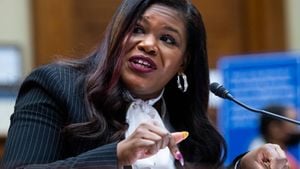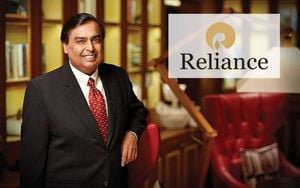An insurance magnate who was once a big political donor in North Carolina is facing serious consequences after pleading guilty to charges related to what prosecutors have described as a massive $2 billion fraud scheme. Greg E. Lindberg, 54, who now resides in Tampa, Florida, entered his plea before U.S. Magistrate Judge David Keesler on Tuesday. He has been charged with conspiracy to commit offenses against the United States and conspiracy to commit money laundering.
Lindberg's actions were found to involve multiple companies through which he allegedly skimmed substantial funds for personal gains, significantly defrauding insurance regulators and policyholders over several years. The case against him is not just isolated to this recent plea; he has faced intense scrutiny since he was indicted on 13 accounts back in February 2023.
During the plea hearing held in Charlotte, Lindberg could potentially face up to 15 years in prison if the court maxes out his sentencing time on two charges: up to 10 years for money laundering and five years for conspiracy. Lindberg was already grappling with legal troubles from previous convictions related to bribery attempts directed at securing favorable treatment from North Carolina's insurance commissioner.
His earlier conviction stemmed from attempts to incentivize state regulatory officials, with earlier convictions being vacated by higher courts, ordering retrials. A recent jury found him guilty of bribery, due to attempts to leverage his connections for regulatory favoritism. Lindberg's complex web of corporate dealings and political contributions has revealed how intertwined his business practices were with his political aspirations.
According to legal documents, Lindberg was involved with several companies and allegedly conspired from at least 2016 through 2019 with associates to engage in activities underpinning insurance business fraud, wire fraud, and advisory fraud. His alleged deceptions included hiding the actual condition of his insurance companies and leveraging company funds for personal ventures, thereby avoiding regulatory oversight.
The elaborate nature of the scheme reportedly allowed Lindberg to direct over $2 billion of capital between his companies, deceiving regulators and endangering the fiscal safety of thousands of policyholders. U.S. Attorney Dena J. King remarked on the criminal magnitude, noting how Lindberg’s operations not only harmed those affected but created severe risks for the entire insurance industry. It was said he personally benefited from forgiving significant loans—over $125 million—taken from the companies he controlled, which were then funneled back to himself.
Federal law enforcement—including the FBI and the U.S. Securities and Exchange Commission—was heavily involved during the investigation of Lindberg’s dealings. His case reflects broader concerns about regulatory compliance and ethical governance within the insurance and financial services sectors.
Despite his predicaments, Lindberg boasts past influence with political donations exceeding $5 million since 2016, where contributions favored primarily Republican candidates but also included support for Democrats. Lindberg’s influence may have granted him considerable clout beforehand, yet this situation demonstrates the consequences of misuse of power and trust.
At this point, Lindberg's sentencing has yet to be determined. He recently requested to be placed under the supervision of a halfway house as he awaits the finalization of his sentencing, which presents another layer of complexity to his already dim legal outlook. Lindberg's top executive remains entangled, still awaiting sentencing after pleading guilty to related conspiracy charges late last year, adding to the extensive reputations at stake due to fraud allegations.
North Carolina’s Insurance Commissioner Mike Causey reiterated the commitment of his administration to coordinate with federal prosecutors to seek restitution for victims. The recovery process is expected to remain systematic, aiming to address the losses inflicted on countless policyholders throughout this ordeal.
With the backdrop of Lindberg's fall from grace, it raises questions about the roles and responsibilities of insurance regulators, political donors, and the business practices they employ. The ramifications of this case extend beyond Lindberg, potentially reshaping how both stakeholders and the general public perceive governance within the insurance industry.
Overall, Lindberg's case serves as yet another cautionary tale highlighting what happens when financial ethics are pushed to the limits, posing serious consequences not just for the wrongdoer but for entire sectors dependent on trust and integrity.



